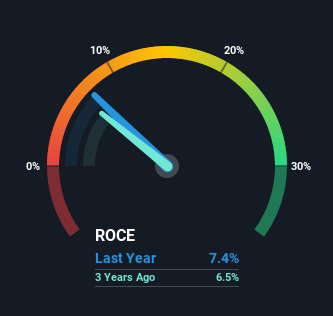- Germany
- /
- Real Estate
- /
- XTRA:AMM
Returns On Capital Signal Tricky Times Ahead For Grounds Real Estate Development (ETR:AMMN)
If we want to find a stock that could multiply over the long term, what are the underlying trends we should look for? In a perfect world, we'd like to see a company investing more capital into its business and ideally the returns earned from that capital are also increasing. Basically this means that a company has profitable initiatives that it can continue to reinvest in, which is a trait of a compounding machine. Having said that, from a first glance at Grounds Real Estate Development (ETR:AMMN) we aren't jumping out of our chairs at how returns are trending, but let's have a deeper look.
Understanding Return On Capital Employed (ROCE)
For those who don't know, ROCE is a measure of a company's yearly pre-tax profit (its return), relative to the capital employed in the business. Analysts use this formula to calculate it for Grounds Real Estate Development:
Return on Capital Employed = Earnings Before Interest and Tax (EBIT) ÷ (Total Assets - Current Liabilities)
0.074 = €4.2m ÷ (€93m - €35m) (Based on the trailing twelve months to June 2021).
Thus, Grounds Real Estate Development has an ROCE of 7.4%. In absolute terms, that's a low return and it also under-performs the Consumer Durables industry average of 11%.
View our latest analysis for Grounds Real Estate Development

Above you can see how the current ROCE for Grounds Real Estate Development compares to its prior returns on capital, but there's only so much you can tell from the past. If you'd like, you can check out the forecasts from the analysts covering Grounds Real Estate Development here for free.
So How Is Grounds Real Estate Development's ROCE Trending?
When we looked at the ROCE trend at Grounds Real Estate Development, we didn't gain much confidence. Around four years ago the returns on capital were 12%, but since then they've fallen to 7.4%. Although, given both revenue and the amount of assets employed in the business have increased, it could suggest the company is investing in growth, and the extra capital has led to a short-term reduction in ROCE. If these investments prove successful, this can bode very well for long term stock performance.
On a side note, Grounds Real Estate Development has done well to pay down its current liabilities to 38% of total assets. That could partly explain why the ROCE has dropped. Effectively this means their suppliers or short-term creditors are funding less of the business, which reduces some elements of risk. Some would claim this reduces the business' efficiency at generating ROCE since it is now funding more of the operations with its own money.
The Bottom Line
In summary, despite lower returns in the short term, we're encouraged to see that Grounds Real Estate Development is reinvesting for growth and has higher sales as a result. And the stock has followed suit returning a meaningful 34% to shareholders over the last three years. So should these growth trends continue, we'd be optimistic on the stock going forward.
If you want to know some of the risks facing Grounds Real Estate Development we've found 4 warning signs (2 are concerning!) that you should be aware of before investing here.
If you want to search for solid companies with great earnings, check out this free list of companies with good balance sheets and impressive returns on equity.
New: Manage All Your Stock Portfolios in One Place
We've created the ultimate portfolio companion for stock investors, and it's free.
• Connect an unlimited number of Portfolios and see your total in one currency
• Be alerted to new Warning Signs or Risks via email or mobile
• Track the Fair Value of your stocks
Have feedback on this article? Concerned about the content? Get in touch with us directly. Alternatively, email editorial-team (at) simplywallst.com.
This article by Simply Wall St is general in nature. We provide commentary based on historical data and analyst forecasts only using an unbiased methodology and our articles are not intended to be financial advice. It does not constitute a recommendation to buy or sell any stock, and does not take account of your objectives, or your financial situation. We aim to bring you long-term focused analysis driven by fundamental data. Note that our analysis may not factor in the latest price-sensitive company announcements or qualitative material. Simply Wall St has no position in any stocks mentioned.
About XTRA:AMM
Grounds Real Estate Development
A real estate company, engages in the development, management, rental, and sale of residential properties in Germany.
Slight risk and fair value.
Market Insights
Community Narratives



